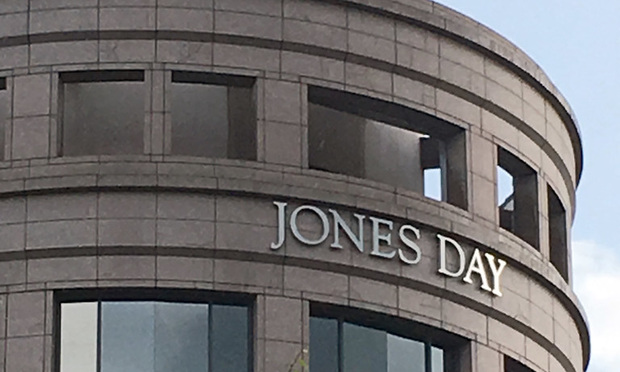Ex-Jones Day Associates Blast Bid for Sanctions in Gender Bias Lawsuit
Jones Day had accused the plaintiffs of using "sophistry" to back up their $200 million proposed class action.
January 08, 2020 at 02:32 PM
4 minute read
 (Photo: John Disney/ALM)
(Photo: John Disney/ALM)
Lawyers pursuing a $200 million gender discrimination lawsuit against Jones Day have fired back at the firm's request for sanctions, arguing in a Tuesday brief that it relied on "cherry-picked handful of facts and misleading caricatures" of their claims.
In a 44-page filing in Washington, D.C., federal court, attorneys for Sanford Heisler Sharp said their clients, six former female associates of the Am Law 50 firm, have "at least six independent bases for believing that women at Jones Day are paid less than men."
The plaintiffs witnessed and experienced discrimination in Jones Day's performance evaluation process, and they're prohibited from discussing their pay under the firm's black box compensation structure, the Sanford Heisler lawyers asserted.
The Rule 11 sanctions motion Jones Day filed in December requires a "patently clear" showing that the claim has "absolutely no chance of success'—even in view of 'the freedom to litigate creatively and vigorously,'" the plaintiffs attorneys wrote, arguing that Jones Day had not met that burden.
Jones Day's associate compensation system is "jealously guarded" by the firm and that information could "conclusively prove or disprove plaintiffs' allegations regarding systemic disparities in pay," the brief argues. "Plaintiffs' pay claims thus present the archetypal situation contemplated by Rule 11 in which a party has good reason to believe an allegation while also requiring discovery to confirm that belief," the plaintiffs said.
 Former Jones Day associates Andrea Mazingo (left) and Nilab Rahyar Tolton. (Courtesy photo)
Former Jones Day associates Andrea Mazingo (left) and Nilab Rahyar Tolton. (Courtesy photo)Jones Day claimed last month that the facts that have been revealed so far in the lawsuit filed by plaintiffs Nilab Rahyar Tolton, Andrea Mazingo, Meredith Williams, Jaclyn Stahl, Saira Draper Katrina Henderson undermine and contradict their claims. As a result, all of the plaintiffs' claims based on disparate pay should be tossed, costs and fees should be awarded to the firm, and potential sanctions should be considered, according to the firm.
The firm pointed to Williams' deposition, in which she wrote that she and her co-plaintiffs were not compensated at the top-market rates for associates set by Cravath, Swaine & Moore, and suggested that others at the firm were getting Cravath-level pay. But Jones Day said the plaintiffs couldn't point to anyone else at the firm who was being compensated on that scale.
"Their principal theory of the case—that the proof of discrimination is the fact that plaintiffs did not earn 'Cravath scale'—was sophistry on its own terms," Jones Day argued. "And, to make matters worse, plaintiffs knew facts that contradicted their theory and knew no facts that supported it."
In a statement, Russell Kornblith, the managing partner of Sanford Heisler and one of the plaintiffs' attorneys, renewed his call for Jones Day to open up about its compensation practices.
"People should ask what Jones Day is hiding by refusing to release its pay data. The brief sets out good reasons to believe that the data will reveal gender-based disparities in pay. Why won't Jones Day let us see it?" he said.
Attorneys for Jones Day, which is representing itself in the case, did not respond to requests for comment.
Read More
Jones Day Wants Sanctions in Gender Bias Case, Says Lawyers Bungled 'Cravath Scale' Claims
Collective Action Bid Ups the Ante in Jones Day Associates' Gender Bias Case
Jones Day Remains Locked in Court Battle With Plaintiffs Suing Firm Over Bias Claims
Jones Day Attacks 'Warped Portrayal' in $200M Gender Bias Class Action
Jones Day Bias Claims Spread to Atlanta, New York as More Accusers Go Public
This content has been archived. It is available through our partners, LexisNexis® and Bloomberg Law.
To view this content, please continue to their sites.
Not a Lexis Subscriber?
Subscribe Now
Not a Bloomberg Law Subscriber?
Subscribe Now
NOT FOR REPRINT
© 2025 ALM Global, LLC, All Rights Reserved. Request academic re-use from www.copyright.com. All other uses, submit a request to [email protected]. For more information visit Asset & Logo Licensing.
You Might Like
View All
Government Attorneys Face Reassignment, Rescinded Job Offers in First Days of Trump Administration
4 minute read


Energy Lawyers Field Client Questions as Trump Issues Executive Orders on Industry Funding, Oversight
6 minute readLaw Firms Mentioned
Trending Stories
- 1We the People?
- 2New York-Based Skadden Team Joins White & Case Group in Mexico City for Citigroup Demerger
- 3No Two Wildfires Alike: Lawyers Take Different Legal Strategies in California
- 4Poop-Themed Dog Toy OK as Parody, but Still Tarnished Jack Daniel’s Brand, Court Says
- 5Meet the New President of NY's Association of Trial Court Jurists
Who Got The Work
J. Brugh Lower of Gibbons has entered an appearance for industrial equipment supplier Devco Corporation in a pending trademark infringement lawsuit. The suit, accusing the defendant of selling knock-off Graco products, was filed Dec. 18 in New Jersey District Court by Rivkin Radler on behalf of Graco Inc. and Graco Minnesota. The case, assigned to U.S. District Judge Zahid N. Quraishi, is 3:24-cv-11294, Graco Inc. et al v. Devco Corporation.
Who Got The Work
Rebecca Maller-Stein and Kent A. Yalowitz of Arnold & Porter Kaye Scholer have entered their appearances for Hanaco Venture Capital and its executives, Lior Prosor and David Frankel, in a pending securities lawsuit. The action, filed on Dec. 24 in New York Southern District Court by Zell, Aron & Co. on behalf of Goldeneye Advisors, accuses the defendants of negligently and fraudulently managing the plaintiff's $1 million investment. The case, assigned to U.S. District Judge Vernon S. Broderick, is 1:24-cv-09918, Goldeneye Advisors, LLC v. Hanaco Venture Capital, Ltd. et al.
Who Got The Work
Attorneys from A&O Shearman has stepped in as defense counsel for Toronto-Dominion Bank and other defendants in a pending securities class action. The suit, filed Dec. 11 in New York Southern District Court by Bleichmar Fonti & Auld, accuses the defendants of concealing the bank's 'pervasive' deficiencies in regards to its compliance with the Bank Secrecy Act and the quality of its anti-money laundering controls. The case, assigned to U.S. District Judge Arun Subramanian, is 1:24-cv-09445, Gonzalez v. The Toronto-Dominion Bank et al.
Who Got The Work
Crown Castle International, a Pennsylvania company providing shared communications infrastructure, has turned to Luke D. Wolf of Gordon Rees Scully Mansukhani to fend off a pending breach-of-contract lawsuit. The court action, filed Nov. 25 in Michigan Eastern District Court by Hooper Hathaway PC on behalf of The Town Residences LLC, accuses Crown Castle of failing to transfer approximately $30,000 in utility payments from T-Mobile in breach of a roof-top lease and assignment agreement. The case, assigned to U.S. District Judge Susan K. Declercq, is 2:24-cv-13131, The Town Residences LLC v. T-Mobile US, Inc. et al.
Who Got The Work
Wilfred P. Coronato and Daniel M. Schwartz of McCarter & English have stepped in as defense counsel to Electrolux Home Products Inc. in a pending product liability lawsuit. The court action, filed Nov. 26 in New York Eastern District Court by Poulos Lopiccolo PC and Nagel Rice LLP on behalf of David Stern, alleges that the defendant's refrigerators’ drawers and shelving repeatedly break and fall apart within months after purchase. The case, assigned to U.S. District Judge Joan M. Azrack, is 2:24-cv-08204, Stern v. Electrolux Home Products, Inc.
Featured Firms
Law Offices of Gary Martin Hays & Associates, P.C.
(470) 294-1674
Law Offices of Mark E. Salomone
(857) 444-6468
Smith & Hassler
(713) 739-1250










